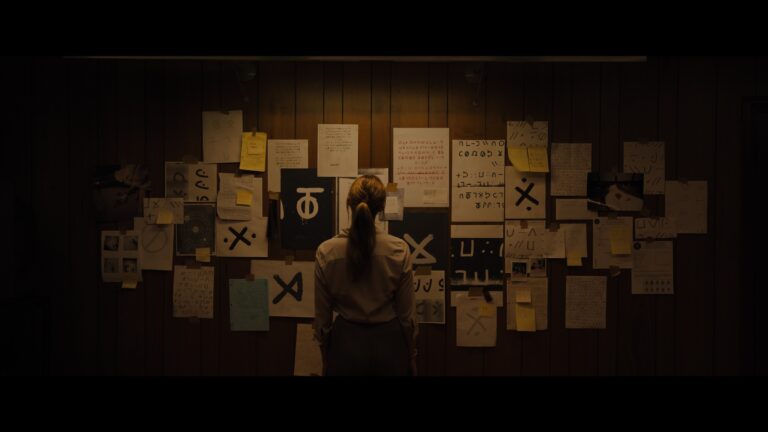Longlegs (2024 | USA | 101 minutes | Osgood Perkins)
Early in Osgood Perkins’s new much-hyped horror, Longlegs, superior FBI Agent Carter (a delightfully mustachioed, loquacious, drink-loving Blair Underwood) utters the phrase “My Beautiful Mariners”. It’s the dead of winter and they’re in a car somewhere in small town Oregon (Vancouver surroundings standing in, possibly for Medford). The simple optimistic phrase will send an unshakeable chill down the spine of any viewer who knows what agonies await. Old cars, no cell phones, and a freshly hung Bill Clinton photo behind his Oregon field office desk situates time period as late 1993 or early 1994.* (The previous season saw the Mariners win 82 games, ending 12 behind; ominously, the upcoming season he’s dreaming about would be drastically shortened by a strike.)
Without getting into spoilers, it’s probably telling that a passing reference to a sports franchise that’s frequently punished my own foolish heart was the most haunting part of a film that’s been breathlessly promoted as one of the scariest of the year. Perkins — son of a horror legend, actor, writer, and director of creepy tone poems like the Blackcoat’s Daughter — accomplishes a great deal, pulling techniques from psychological horror and employing the mode of serial killer procedurals to make his own version of a deeply unsettling theory-board collage of his own. Structured into three acts with a tantalizingly withholding amuse bouche of a prologue, the vibes are immaculate. Frustratingly, the whole thing self-immolates in its final chapter and destroyed all the goodwill that it worked so hard to build. Early reactions seem far more forgiving than mine.
Back then, into the breach. The question about baseball is posed to a socially withdrawn rookie agent, Lee Harker, somewhere on the spectrum between “highly intuitive” and “psychic” whose talents he hopes to apply to an perplexing unsolved long-running case. With an intensely-focused demeanor bordering on spacey recluse, indie horror darling Maika Monroe is swinging for the fences of the cinematic pantheon of intense crime solvers alongside Clarice Starling of or Lisbeth Sander. Early in the film she demonstrates her preternatural powers of perception by quietly identifying one house out of a cookie-cutter development as the one that’s harboring a vicious killer who dispatches her eager partner’s chiseled face at the doorstep. Now she’s being pulled in to help solve a deeply unsettling series of mysterious “annihilation” killings that have trickled across the years. In each, without any history of violence or troubles, a family member has killed everyone in the house before ending their own life. Cryptic cypher-encoded Zodiac-style letters signed “Longlegs” are the only trace of any outside presence; and someone in the household being born on the fourteenth the only semblance of a pattern.
It’s a deeply creepy series of crimes and the execution of the filmmaking matches its freak. Shot in constrained and grainy super-eight, the prologue shows us the quickest glimpse of this scraggly haired Longlegs character and their singsongy voice and nonsensical ramblings, all kept mostly out of frame as encountered from the vantage of young girl in a snowy rural yard. Then just as we get a clear look at this disturbing figure, it snaps into crisp digital (lensed by Andrés Arochi in a the restrained palette of northwest winter and dark wood paneled interiors). His camera centers each subject and cuts precisely through monotonous briefings, unsettling action, meditative murder boards, and abstract cutaways.
We’re left to piece together Harker’s backstory through context: her withdrawn discomfort around others (including Carter’s daughter whose birthday is coming up), one-sided late-night chats with a religious mother, and whatever tidbits her boss can get out of her. Smooth wide-angle shots through her mist-shrouded log cabin create a sense of ominous dread when a nighttime visitation brings her a Longlegs letter of her own. The soundscape growls at barely perceptible levels, inducing a woozy sense of discomfort, ASMR-style. These aesthetic techniques build tension as she builds her own theory walls, spreads case files on the scarlet carpeting, and soon cracks the code. Her prodigiously insights rapidly accelerate the case to an exploration of a creepy crime scene barn that’s so exceptionally lit by two flashlights piercing the foreboding dark setting that you barely even question why it’s happening at night or mind the cliche object they find hidden below the rafters.
Perkins lays out the first two chapters in clinical fashion, introducing new oddities as Harker cuts through the case. We follow her as she meets the lone survivor of one set of murders (an otherworldly cameo by Kiernan Shipka) and tag along as she endures an awkward sleepover with her devout mother (a long-haired Alicia Witt, uncharacteristically plain jane in shut-in hoarder mode). Throughout, the alleged mastermind looms in the distance as we begin to wonder about Lee’s connections to the case and how she’s able to make such progress. Things get weirder and weirder, but we’re lulled into the delusion that we’re watching a highly controlled mostly-realist Fincher-ian procedural with oddities on the periphery, until it drastically gives up, becomes disappointedly over-explanatory, and leans fully into bizarro and supernatural elements. It’s a precipitous falloff from an impressively assured setup.
This huge tonal swing occurs when the action incongruously switches from Harker’s close perspective to Longlegs. After creating so much menace through absence, Perkins gives up withholding and lets Nic Cage cook. His characterization as a glam satanist is the biggest thing in the movie: bleached long scraggly hair, androgynous-to-femme-presenting clothing, a lispy falsetto, pale makeup, bad lipstick, erratic hand-dance movements, and layers of prosthetics to conjure bad cosmetic surgeries. Cage has said many of the mannerisms are based on his mother. Too caught up in the grand operatics of creating a monster to investigate whether the character might be the latest in a series of #problematic movie villains, Cage (among the film’s producers), turns all the performance dials up so hot that they threaten to melt the film strip. It’s an outsized creation for the ages, but intentionally or not, it quickly becomes one of near-parodic comedy whose implications — particularly how they might be a dark mirror of Perkins’s own familial biography — are barely investigated.
I’m not often one for scary movies, so some of my distaste may be self-protective dissociation on my part. A lot of preview audiences gasped about this being the scariest movie in ages; so I’ll acknowledge that my finding the characters silly, the explanations laughable, and the choices idiotic as the third act boils over might partially be be a coping mechanism. A lot of friends and respected critics have written about the movie getting under their skin and leaving a mode of unshakeable dread; for me it was the crushing disappointment of such a phenomenally promising start that lingers.
(Go M’s.)
Longlegs arrives in theaters on July 12
Image courtesy NEON
* in an interview Perkins says he set the film in 1993, the year after his father Anthony Perkins died from AIDS. Clinton, however, wasn’t inaugurated until January 20.




